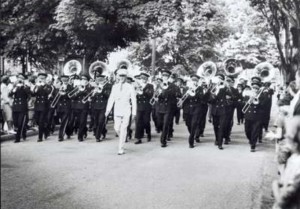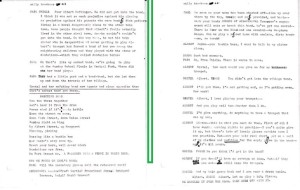
In his November 5 talk on “James Reaney and Music”, composer John Beckwith recalls their collaboration on a children’s story with symphonic music, All the Bees and All the Keys: “He said he had always wanted to write about a) bees and bee-keeping and b) small-town Ontario marching bands.” Beckwith also mentioned a scene in James Reaney’s play I, The Parade, where a penniless band with no instruments has to perform with dandelion horns.
I, The Parade tells the story of bandmaster and composer Charles F. Thiele (1884-1954), bandmaster of the Waterloo Musical Society (1919-1951) and Father of Canadian Band Music.* Commissioned as part of the City of Waterloo’s 125th anniversary celebrations, the play was presented at the University of Waterloo in November 1982.

In I, The Parade, the penniless dandelion-horn band appears in a story-within-a-story (told by Charles F. Thiele’s mother and father) that hints at some of the history of the Waterloo Band and its rivalry with the Berlin [Kitchener] Band. As John Mellor notes in his memoir about Professor Thiele, “This keen rivalry between the bands of Waterloo and Berlin/Kitchener became so intense that for a long period no Berlin musicians played in the Waterloo band and vice versa.”**
In this scene from Act I, trumpeter Albert Nafzinger is blackballed from joining the Music Society Band because he lives in the rival village. His sister, Gretel, desperate to play in a band but without an instrument, forms a band of her own: “… and they played with the stems of dandelions — which they called dandelion horns […]”
MARCHING SONG
One two three together
Let’s hear it from the drum
Never mind if it’s a rusty kettle
Down the street we come
Down Park Street, down Union Street,
Turning right on King
Up Albert Street, up Margaret
Playing, playing
Buzzing like a bumble bee
Our music’s easy come by.
Break your horn, we’ll never mind:
On Park Street &c. A PASSERBY PUTS A PENNY IN THEIR DRUM.
[Angry at not getting into the band, Albert plots his revenge:]
ALBERT: Gretel, how much would you give me for my trumpet.
GRETEL: Albert. (PAUSE) You didn’t get into the village band.
ALBERT: I’ll get them. I’m not getting mad, no I’m getting even. […]
GRETEL: I’d give anything, do anything to have a trumpet that was my own.
ALBERT: Listen – this is what you must do then. First of all I have Sunday morning rights to practise – I can’t quite give it up, but there’s lots of lonely places outside town I can practise. But – cut your hair real short, put on a suit of my clothes and audition for the empty place in the band and. (PAUSE) It’s all yours.
GRETEL: Do you think I’d get in the band?
ALBERT: If you do, I’ll have my revenge on them. But – if they keep you out – I still keep the trumpet.
GRETEL: And my hair grows back and I can wear a dress again. Albert. (PAUSE) Albert, let me play a bit. Please.
HE DANGLES IT OVER HER HEAD, THEN RUNS OFF WITH IT.

Note from Susan Reaney: This scene is excerpted from a draft manuscript version of I, The Parade, which is part of the James Reaney fonds at Western University Archives. The title at the top reads “Sally Trombone”, which is a ragtime-influenced novelty tune from 1917 featuring a “trombone smear” (true glissando), the specialty of composer and bandleader Henry Fillmore (1881-1956).
* For more about C.F. Thiele, see John Mellor’s book Music in the Park: C.F. Thiele Father of Canadian Band Music (1988), Waterloo, Ontario. ISBN 0-9692301-2-5
** John Mellor, Music in the Park, page 18.

